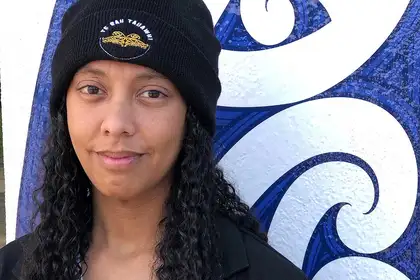
Nkhaya Paulsen-More.
“Don’t be afraid you’re not Māori enough.” That’s the message from the new Tumuaki Takirua (co-president) of Te Mana Ākonga (National Māori Students Association) for 2021. Nkhaya Paulsen-More (Ngāti Maru (Hauraki), Ngāruahine, Ngāti Pūkenga) has been elected by the national body alongside Renata White (Tītahi Ki Tua) from AUT.
Ms Paulsen-More is the current president of Te Waka o Ngā Akonga Māori (Albany Māori Students Association) and is in her final semester at Massey, completing a Bachelor of Arts in English with a minor in Creative Writing. Next year she intends moving into a Master of Arts in Creative Writing.
She says there are a lot of tauira Māori who feel they’re not Māori enough to be part of Māori organisations within Universities. “They’re worried because they don’t know the reo or tikanga, and don’t know anything about te ao Māori. I was in the exact same position at the beginning of 2019. I didn’t know anything!” Ms Paulsen-More says her decision to go along to a Māori student campus event run by Te Rau Tauawhi (Māori Student Support Centre) changed everything.
“I went to a Kai and Kōrero event and thought – what is this? Now
I’m standing here in a position where people trust me enough to co-lead a national body of Māori students, so there is no such thing as Māori enough.”
Ms Paulsen-More is passionate about ensuring the voice of tauira Māori is heard: “I want to see more tauira Māori engagement at the higher levels of tertiary institutions, such as academic boards.
“I want to ensure there’s a place for Māori students and that they’re not excluded from the kōrero that happens in higher echelons.” She says, “At the moment our inclusion depends on whether senior leadership teams ask us in and I think we should be there by right.”
She says the role of Te Mana Ākonga to advocate for tauira Māori has never been more important with the impacts of COVID-19 hitting students hard. Ms Paulsen-More says there were many who couldn’t access hardship grants and were thinking of dropping out of study because it was easier to get a wage subsidy than a hardship grant from a university. “I think if you’re a tertiary student your university or institute should be taking care of you.”
Recent media discussion around racism in tertiary institutions came as no surprise to Ms Paulsen-More who says the Māori student associations have dealt with many examples. She’s keen to ensure they continue to advocate for students and spotlight situations where tuaira Māori are being disadvantaged.
She also feels the institutions have a responsibility to ensure tauira Māori can sustain their cultural identity. “They need to ensure students can be involved in tikanga and te ao Māori and not feel that they’re alone.” She says her journey is an example of the huge benefits that can come from forging those cultural connections.